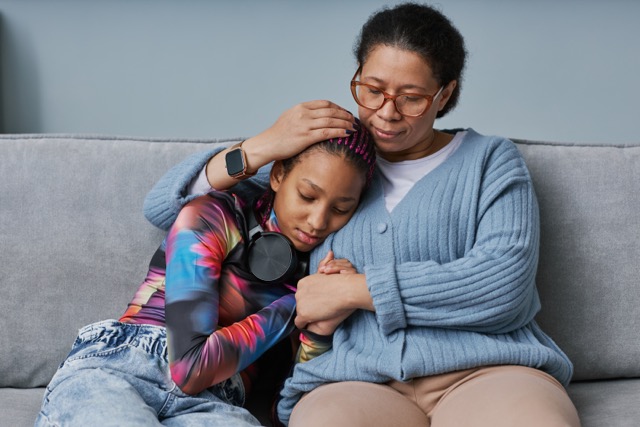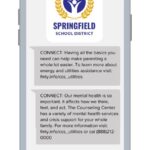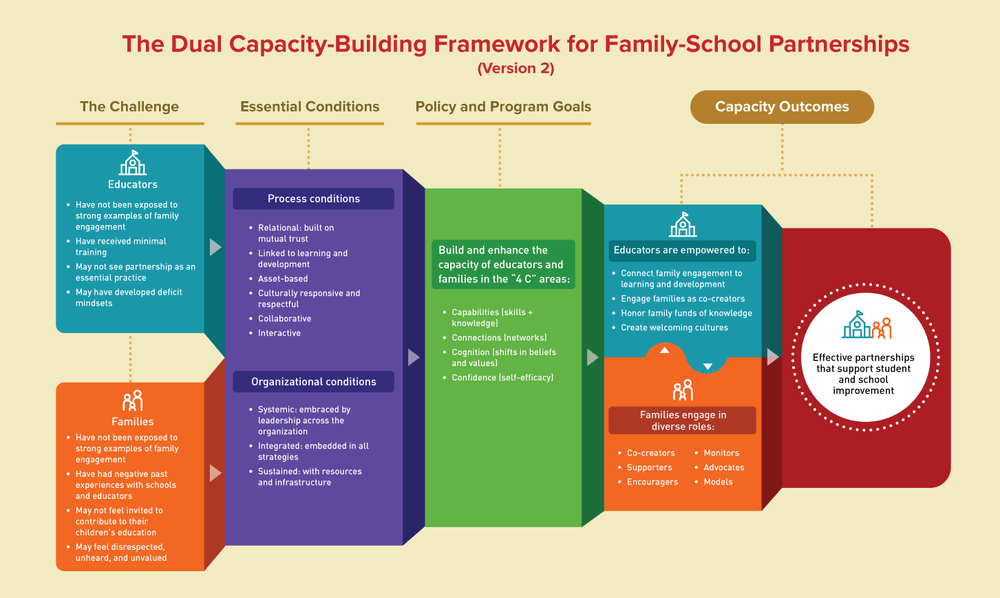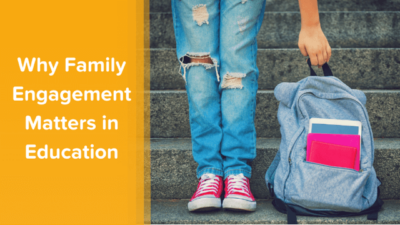By Maren Madalyn, contributing writer
We’ve all seen the headlines: student mental health has become a national priority. Students and their families are having a hard time, and educators are working tirelessly to meet these emergent, evolving mental health needs as best as they can.
But supporting student mental health isn’t any one person or even one school’s responsibility. Instead, it takes a village to nurture mental wellbeing. When educators and families approach supporting student health as a community-wide effort — one that involves families, educators, and partnerships beyond schools — everyone has a greater opportunity to thrive as whole human beings.
Mental health: a growing crisis for students
Before we can understand the pressing mental health needs that students have today, let’s first clarify what this important term means.
When educators or families think of ‘mental health,’ they may imagine specific examples of illnesses, such as depression, anxiety, or bipolar disorder. In general, SAMHSA explains that mental health refers to one’s psychological, emotional, and social well being:
“It affects how we think, feel, and act, and helps determine how we handle stress, relate to others, and make choices.”
SAMHSA
Factors that can affect mental health include biology (genes or brain chemistry), life experiences (such as trauma or adverse childhood experiences), and family history with mental health issues.
While the umbrella of mental health includes specific diagnosable conditions, it’s important to remember that the nuance involved in challenges like anxiety or depression. The National Institute of Mental Health clarifies that mental illnesses “include many different conditions that vary in degree of severity, ranging from mild to moderate to severe.”
Student mental health resources can involve health professionals who offer services such as counseling or crisis intervention support, or referrals to community mental health supports uniquely tailored to particular student backgrounds. It also encompasses “everyday” strategies like helping kids cultivate positive social relationships and practice coping skills when feeling overwhelmed. All of these strategies contribute to students’ emotional health.
The impact of COVID-19 on student mental health and school communities
According to their 2023 trends report the American Psychological Association highlights that the current challenges with youth mental health in the United States began long before the pandemic shut classroom doors. Results from the Center for Disease Control (CDC) Youth Risk Behavior Surveillance System, a survey that tracks behaviors among students in grades 9 through 12, indicate that in the decade leading up to the pandemic, “feelings of persistent sadness and hopelessness—as well as suicidal thoughts and behaviors—increased by about 40% among young people.”
Add this to the social isolation, academic disruptions, the loss of a loved one or caregiver, and many more stressors brought on by the pandemic. Then weave in concerns on the global stage — social media, gun violence, war, and climate change, just to name a few.

The result is a mountain of pressures that would take a toll on any individual’s mental wellbeing, especially children and teens learning how to navigate the world around them.
Educators and families as a first line of support
Among the first adults to witness signs of disruption to student wellness are educators and family members. When a teacher notices a change in a kid’s behavior, such as a sudden loss of appetite or social withdrawal, they have the opportunity to intervene, with the help of their community and professional resources where needed.
Many schools are working hard to provide students and staff with the support they need to help kids navigate the mental health challenges they’re facing. However, the Pew Research Center found that, as of 2022, only half of public schools in the United States have the resources they need to provide mental health assessments, let alone specialized services.
Though there is increased awareness and funding available, educators may feel overwhelmed with the pressure to positively impact student mental health. Additionally, working with kids who may have experienced trauma takes a toll on school and district staff, who often do not have the resources and support they need to navigate secondary traumatic stress or compassion fatigue.
This is why families are an essential part of the school team nurturing student wellness.
The power of family-school partnerships in supporting student mental health
Families play a critical role in helping kids thrive emotionally, just as their teachers, school leaders, and even mental healthcare providers like social workers do.
Research already shows the power of family engagement, yielding benefits like improved reading and math scores, student engagement, and graduation rates. But family-school partnerships also bolster student behavior regulation, readiness to learn, and even teacher satisfaction. Additionally, families are well positioned to support kids with developing certain social emotional competencies by grade level that can promote health and mental wellbeing.
Adolescent family engagement is just as important as early childhood and elementary school family engagement to nurturing emotionally healthy students. Pre-teens and teens are particularly vulnerable when it comes to their mental health.
Certain mental illnesses such as anxiety, schizophrenia, and bipolar disorder begin to reveal themselves during these crucial years (U.S. Health & Human Services). Strong family relationships with educators means that a teen navigating such challenges has adults all around them who care and are ready to help — both in the classroom and beyond.
What can educators do to cultivate relationships with their families and move the needle on the student mental health crisis schools are facing today?
7 ways educators and caregivers together nurture wellbeing
ParentPowered is a leader in digital family engagement, and we know how critical caregivers are in supporting student, teacher, and family mental health. Drawing on research from Dr. Karen Mapp’s Dual Capacity Building Framework and our own experiences partnering with K12 organizations, we compiled seven strategies for educators to deepen their collaborations with families in service of students’ wellbeing.
1. Begin with building caregiver trust, the foundation to partnership
For many students, mental health may be an extremely vulnerable topic, about which they may divulge information only to a few trusted ears. The same is true for families. Trust forms the foundation for any successful partnership, and it becomes all the more critical for educators to establish when something as sensitive as student and family mental health care is on the line.
Here are just a few ways that educators can cultivate trust while designing strategies for equitable family engagement that boost mental health supports for kids:
- Create ongoing space for reflection: It is natural for educators to have certain assumptions about family engagement. There are also small but powerful ways to unwind them for the benefit of the entire school community. The first step is to pause and reflect. Teams can use guiding questions such as: “How does your school set the stage for new and returning families to feel included in the community?” and “What actions does the team ask families to take — and can every family complete them, regardless of background?” Reflection is just one of several habits of effective family engagement in schools that educators can bake into their everyday routines.
- Integrate active listening into staff interactions: Active listening is the art of connection using specific skills that facilitate clear, honest, and respectful communication. All of them help trust thrive between people and organizations. By working with school staff to cultivate active listening skills in regular meetings and daily interactions, school administrators are helping their team translate these practices into their family communications, too — directly improving school climate.
2. Support meeting families’ basic needs that impact mental health
Abraham Maslow’s hierarchy of needs offers educators helpful guidance when it comes to supporting student mental health. Through his model, Maslow suggested that, in order for high-order needs to be met at the top of the pyramid, those at the bottom must first be addressed.
When families face challenges with meeting their basic needs — things like housing or access to food that fit into the pyramid’s foundation — it becomes more difficult for them to see their emotional needs met. Student mental health can be at risk as a result, and to no fault of their own or their families.
The great news is that educators can help families with supporting their foundations! Schools are well positioned to connect families with community resources and organizations that can help meet their basic needs.
For instance, schools can:
- Create a family resource wall in the front office with pamphlets, QR codes, and contact information for local mental health organizations or wellness events
- Invite representatives from community resource centers to Open House or Parent Night to share more about their health services for children and families
- Normalize reaching out to families to share community resources through digital family engagement programs like ParentPowered Trauma Informed
Each of these examples helps encourage families to actually contact providers for aid, reduces stigma associated with fulfilling one’s basic needs through community programs, and ultimately creates a more positive view for families on these essential supports.

Each of these examples helps encourage families to actually contact providers for aid, reduces stigma associated with fulfilling one’s basic needs through community programs, and ultimately creates a more positive view for families on these essential supports.
It is helpful to first survey families and understand what support they most need or want to use. That way, educators can immediately help their family community by collaborating with community partners in those areas first.
3. Focus on each family’s strengths
A key element of Dr. Mapp’s framework for family engagement guides educators to craft strategies that emphasize strengths, or assets families already have available. Though subtle, the shift to a strengths-based mindset helps educators uplift caregivers as partners and allies.
Families gain confidence when they recognize and utilize their assets in service of their children, and boosted self esteem contributes to improved mental health and wellbeing (Mann et al, 2004). When parents and caregivers feel empowered to help their students, their children benefit.

ParentPowered designed all of its family engagement programs through a strengths-based lens, creating daily activities that families can do anytime, anywhere, without extra materials or time needed. For our Trauma-Informed curricula specifically, we source input and guidance from mental health specialists who further help ensure our content is supportive and, critically, non-activating for families impacted by trauma. Join an upcoming info session to learn more about our approach to trauma-informed family engagement.
4. Craft culturally responsive family engagement strategies
Mental health carries a different weight and meaning for individuals based on a number of factors, including their cultural background. Different cultures have different perspectives about such vulnerable topics, so it’s important for educators to bear these variations in mind when engaging with families or students about mental health.
Here are a few culturally responsive family engagement practices that schools can initiate on this pathway to partnership:
- Connect with community organizations that families know and trust. This could look like meeting with families during home visits, engaging family liaisons from such organizations with shared cultures or lived experiences. Schools can also partner with community-based organizations to gather insights about each family’s strengths and needs.
- Translate resources and events into all home languages spoken by families in the community. This includes any materials sent home, such as flyers or school newsletters, as well as digital communications like emails with important announcements.
- Integrate diverse imagery of families and students on campus. For example, educators can highlight books from cultural backgrounds found in classrooms at the school library, or add photos of the cultural diversity in the community to school materials.
Download our tip sheet for more culturally relevant family engagement strategies for schools that create a positive school climate for everyone.
5. Prioritize key social emotional skills that boost mental health
Life skills — like positive self-talk, conflict resolution, pro social skills, perseverance, and many more on any social emotional skills list — are among key tools available for students to wield when navigating strong emotions or hard experiences. When caregivers and schools collaborate to nurture student life skills, they help prepare students for such situations. As kids grow into adulthood, this toolkit expands, too. This is how social emotional learning (SEL) can promote student, family, and educator mental health.
Here are a few resources by age group for educators to learn more about SEL and student mental health:
- For families and kids of all ages: SEL Strategies to Help Student Navigate Hard Moments at School and Home (webinar)
- For preschool families: Kindergarten Readiness SEL Bundle (videos)
- For elementary school families: 10 Social Emotional Learning Activities for Elementary Families That Promote Life Skills
- For middle school families: 10 Social Emotional Learning Activities for Middle School
6. Integrate protective factors into everything
The protective factors framework is a core component to trauma-informed practices with families. The model highlights factors that buffer children and adults from the adverse effects of trauma they may have experienced in their lives — effects that can directly impact mental, emotional, and physical health. You may recognize two of the five protective factors, which were already highlighted in this article:
- Concrete supports in times of need (connect families with local resources)
- Social and emotional competence in children (promote social emotional skills)
- Knowledge of parenting and child development
- Parental resilience
- Social connections
This last one is incredibly important for adolescents. Teens may feel reluctant to go to their families for support with stressors like conflicts among friends, peer pressure to engage in uncomfortable behaviors, feelings of depression, or severe anxiety. At the same time that adolescents seek independence from caregivers, though, they are also more vulnerable and need strong adult connections to navigate mental health challenges.
This is where family-school partnerships come in. By building an ecosystem of trusted adults around a teen, educators and families give students people they can reach out to in times of need. In turn, school staff can work with other members of the team (parents, counselors, trusted members of the community, etc) to organize additional services for students facing bigger issues. Having a network of caring adults beyond the family unit is crucial for supporting middle and high schoolers’ mental health.
7. Emphasize self care and mental health for all adults
Finally, anytime educators are strategizing supporting student mental health, it behooves them to also reflect on ways to uplift adult mental health — including for caregivers and educators themselves! As the CDC wisely states, “self care isn’t selfish.”
A caregiver who is exhausted, stressed, or feeling unsupported finds it so much harder to in turn provide care to another. It has nothing to do with how deeply that person cares for the other or their willingness to help. However, when that caregiver feels replenished, they are ready to be present when their students need them. Plus, parents model practices that children will benefit from integrating into their own lives as future adults.
From writing gratitude lists to deep breathing, educators and families alike can explore a myriad of ways to practice self care in small moments. It doesn’t require anything grandiose — just a commitment to honor one’s own needs.

ParentPowered programs offer suggestions to families receiving our messages for cultivating caregiver and parent self-care opportunities. Here’s a favorite example from our team:
- FACT: Teens notice what we do! Carving out time to relax and care for yourself sets a positive example. You’re also recharging. It’s a win for everyone!
- TIP: This evening, spend 10 minutes doing something just for you. Start simple. Read, take a walk, chat with a friend. How did it make you feel?
- GROWTH: Now focus on relaxing. Before bed, try taking 3 deep breaths. Each time you breathe out, relax your body. Think of something that makes you feel proud.
Promoting mental health for the entire family unit
When educators and families partner together, they have the power to create a safe school environment for students, one that nurtures all of them on the journey of growing up. It’s an ongoing community effort to promote wellbeing — emotionally, physically, mentally.
Families love their experiences with ParentPowered’s family engagement programs, and we are proud to provide communities with accessible strategies for supporting student’s wellbeing. Join an upcoming info session to discover which program best fits your family engagement goals.
About the author
Maren Madalyn has worked at the intersection of K12 education and technology for over a decade, serving in roles ranging from counseling to customer success to product management. She blends this expertise with fluid writing and strategic problem-solving to help education organizations create thoughtful long-form content that empowers educators.











